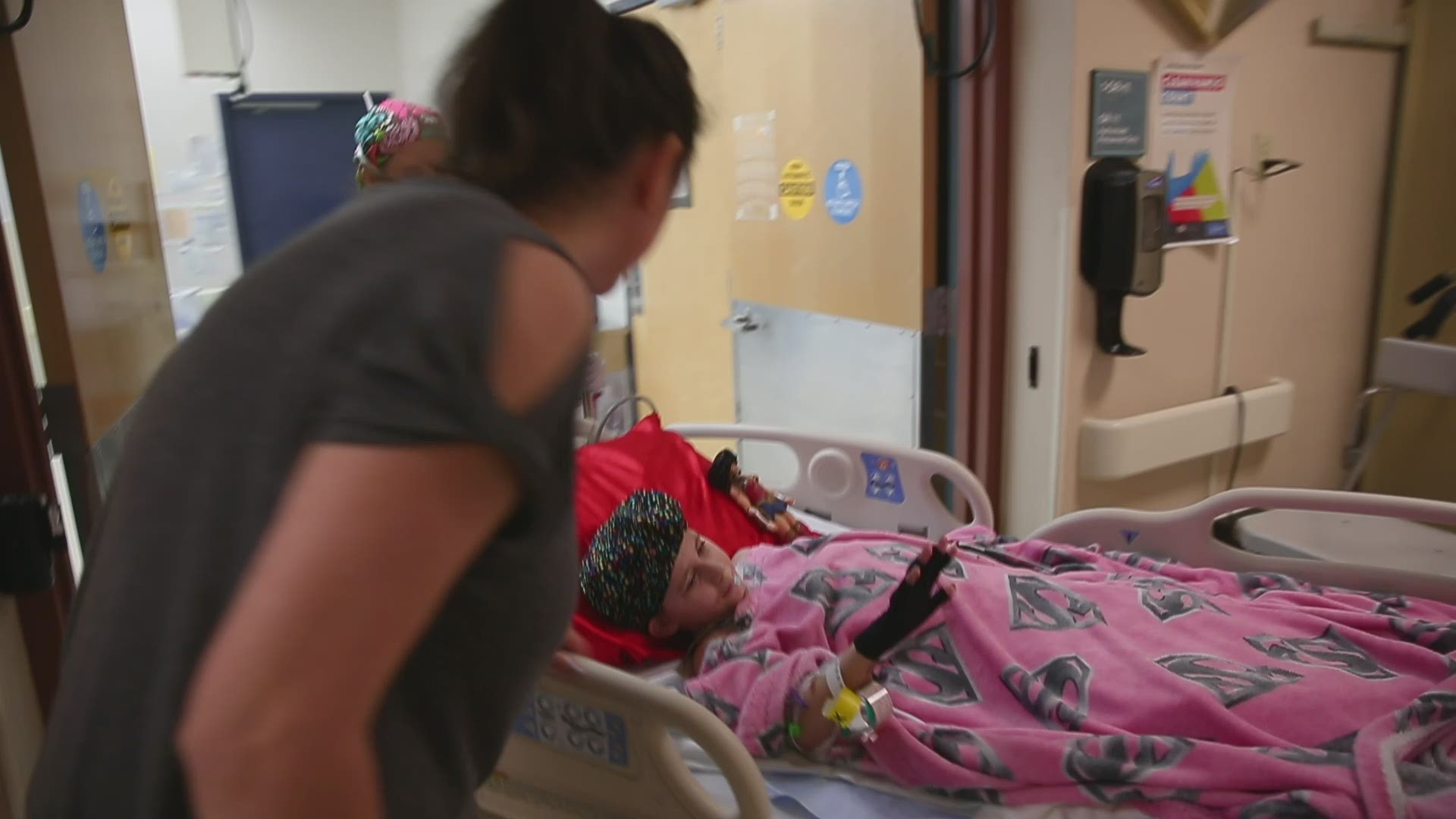Dr. Kevin Foster, head of the Arizona Burn Center in Phoenix, was working on St. Patrick's Day when the call came in.
There had been a horrible accident. As a family in Phoenix was getting ready for a neighborhood party, the father built a fire in a fire pit in his driveway. He had used gasoline to ignite it and it exploded.
He was burned badly and his 8-year-old daughter was engulfed in flames.
In the moment Foster saw Isabella McCune for the first time, saw how badly she was hurt, he thought of his daughter, Katie, who is a few years older than Isabella and also has dark hair and eyes.
He pushed the thought away and focused on the patient.
Foster put Isabella in a drug-induced coma almost immediately. A tube down her throat helped her breathe.
Third-degree burns covered her hands and arms, one side of her torso, her buttocks and legs, front and back. Her face was mostly spared.
Over the next three days, Foster would take Isabella into the operating room several times, slicing open her limbs to relieve pressure from swelling, cutting away the destroyed skin.
It was only the beginning. It would take months to repair the damage. Isabella would hurt all of the time, even with pain medication.
She was burned over 65 percent of her body. She would need extensive skin grafts.
Foster would use the unburned skin on her back, and he'd take more each time her back healed. Using her own skin meant there was less chance of rejection.
It would be harrowing for Isabella. It would be hard on her family. It would haunt Foster.
He focused on what he knew could be. Twenty years ago, Isabella would not have survived this. But Foster and his staff could fix her.
The day would come when Isabella would leave the hospital. She'd go back to school and gymnastics.
Foster would keep that picture in his mind. He'd try to make Isabella see it, too.
Her resilience and strength
In the first six weeks, Isabella underwent 10 surgeries. Skin grafts covered her hands and arms and one leg. Her other leg and buttocks were still raw muscle protected by bandages.
But Isabella worked hard in physical therapy, walking on legs thick with bandages, even through tears. Dr. Foster told her that the more she moved, the better she would heal.
She believed him.
"Isabella is something of an old soul, I think," Foster said. "She seems to understand the big picture. As horrible as her stay here has been, she is graceful and grateful."
Foster was in charge of Isabella's treatment. He knew it would be excruciating.
"To make her better, I have to torture her," Foster said.
Yet Isabella lit up every time she saw the doctor, even when the news was bad. He didn't always feel like he deserved her devotion.
Foster might have left her in that medically-induced coma for longer — it is the best way to deal with the horrendous pain of an injury like this — but in her waking moments, Isabella had pointed at the intubation tube in her mouth and hooked her thumb to tell him to take it out.
Afterward, when Foster put her under to clean her wounds and change her dressings, something that had to be done every other day, in the twilight of anesthesia, Isabella sang Taylor Swift songs.
"I don't know where that kind of resilience comes from," Foster said. "I wish we could bottle it."
A terrible thing, but a hopeful one

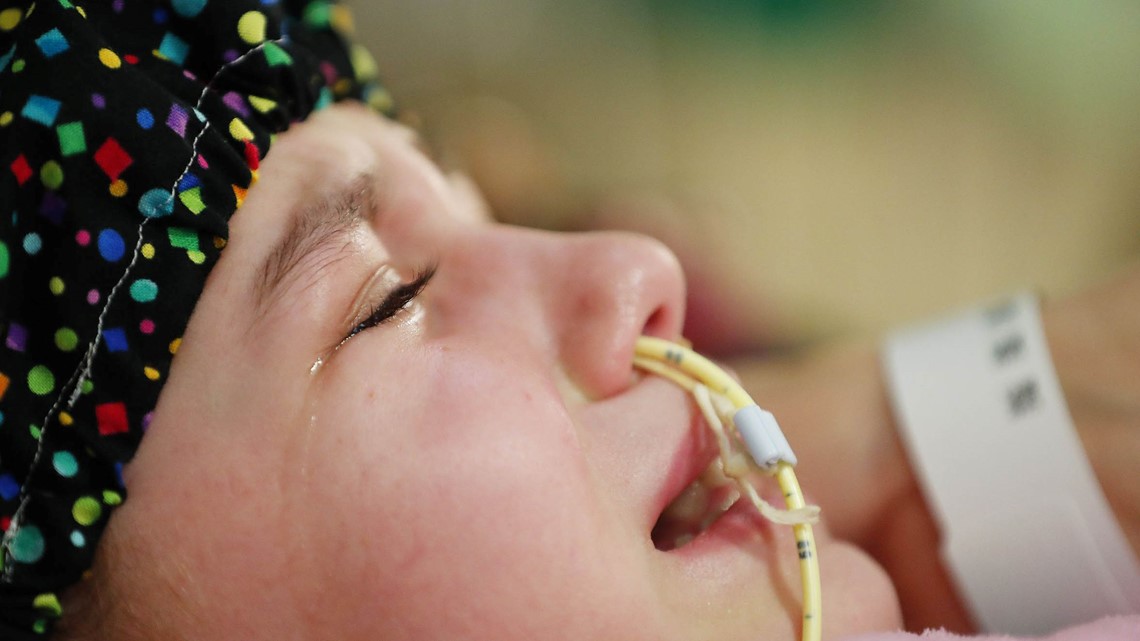
In the evening before a surgery, on May 23, Isabella was drowsy and pale, worn out from a dressing change that morning. She sat in a wheelchair, wrapped in a Super Girl blanket.
She roused herself, eyelids flickering and then opening, when she heard her name and smiled.
After the surgery, Foster told her she would be intubated, which she still hated, for five days, kept unconscious to stay still so she could heal.
Foster hoped this might be her last surgery if he could get enough skin from her back to cover all the areas still exposed: most of her thighs and her backside.
The other areas had healed nicely.
"Possibly," Isabella emphasized. She didn't want to get her hopes up just in case. "Dr. Foster said it could possibly be my last surgery."
She had done this a half dozen times already. It didn't get any easier.
Her mother smoothed the hair near her face. "Are you hot?" Lilly asked.
Isabella shook her head, no. Her tears dropped onto the blanket.
She had been in the hospital for 68 days. She was sitting on raw muscle cushioned with padding and dressings. Her dad asked a nurse for more pain medication.
Isabella hardly ever complained. She was not worried about the surgery.
"Dr. Foster will be there," she said.
Foster was there in blue scrubs, his face covered by a mask. The operating room was warm, almost 100 degrees so Isabella wouldn't get chilled. Without skin, burn victims have trouble regulating their body temperature.
Isabella lay on the surgical table, covered in drapes, just her back and her bare feet showing. An anesthesiologist sat near her head. The team lined up on either side.

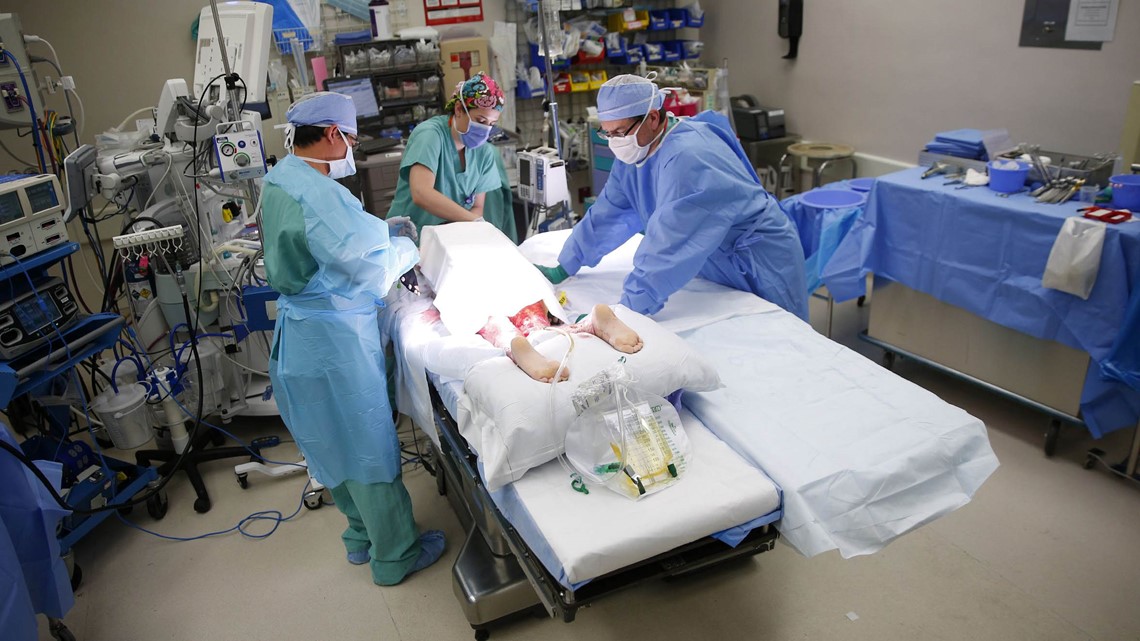
Foster glanced at Isabella's feet. The drapes help them focus on the task at hand.
"We concentrate on the area we are operating on, then it's not Isabella," Foster said. "It's a back and that makes is easier."
It was time to begin.
The team worked methodically, removing skin from Isabella's back in strips, each a couple of inches wide and tissue-paper thin.
The skin grafts were handed down the table and draped over the edge of a bucket filled with saline solution to keep them moist.
Foster sat at a small metal table at the end and ran the strips through a small machine that looked like a pasta maker; it punched holes in the strips, creating a mesh like a fish-net stocking. The skin grafts stretch to cover more surface this way.
It might be enough.
Foster took a small piece of skin to a side table where he mixed it with enzymes that separate the skin cells into a spray solution. He was using an experimental skin spray called ReCell with special permission from the U.S. Food and Drug Administration.
Spraying it over the mesh grafts would help Isabella heal more quickly and with less scarring.
Foster and another surgeon traded off, smoothing the grafts over the exposed areas and securing them to the tissue beneath with a staple gun, the sound sharp in the quiet operating room.
"We are going to do her backside now," Foster said. He carefully lifted first one leg and then the other. Staff murmured to one another as they worked.
"We have enough, guys," Foster said.
All exposed areas were covered. Finally.
It was 11:35 a.m. The surgery took four hours.
Foster stood back, his arms crossed, watching as the grafts were covered with dressings and then bandages and splints.

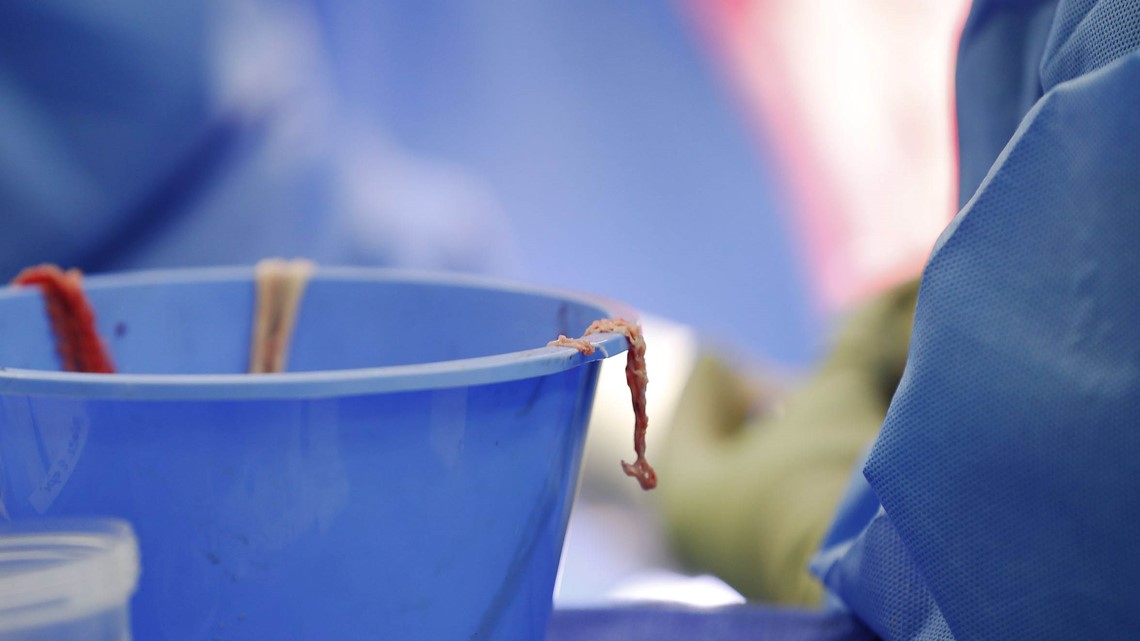
"This is an incredibly horrible invasive thing to do to a human being," he said. "I can't imagine what this must feel like."
This was a tough surgery to go through once. Isabella had done it six or seven times.
"A single skin graft is difficult, yet she has to do it over and over," Foster said. "It's just remarkable how she has dealt with all this pain."
He followed Isabella back to her room. A nurse called her mother and handed Foster the phone.
"Everything went great," Foster told Lilly.
Maybe by the Fourth of July
Isabella had the giggles, though she wasn't sure what was so funny.
"I'm just so happy," she said.
It had been almost three weeks since her last surgery. Her back hurt still, from where skin was taken for grafts.
But if it heals enough by Monday, she could have another surgery to patch a few holes.
"I don't think it will be ready," Isabella said. It turned out that she was right. The surgery would be postponed.
Isabella was ready to go home. Foster had told her maybe by the Fourth of July.
Isabella crinkled her nose and rubbed around the feeding tube that runs down her nostril. She ate a meatball sandwich from Red Devil Italian Restaurant earlier, but she still got about 80 percent of her calories through that tube.
Isabella had told Foster earlier that day that she wants to be a burn nurse.
"I've been through a lot, and I've had a hard time, so I know what it's like," she said.
"I want to help people that have to go through what I've been through. I'll be able to tell them not to be scared," she said.
"I'll be able to tell them, 'You're going to get better someday,' because I'm better now."
A few weeks later, an infection caused Isabella to lose the new grafts, a heartbreaking setback.
Foster moved Isabella into isolation on another floor. The infection resisted antibiotics. She was there through July, August and into September.
On Sept. 10, Foster was stoic as he told Isabella that he was going to put her into another medically-induced coma the next day, intubate her, and instead of cleaning her wounds and changing her dressings every other day, he would do it twice a day.

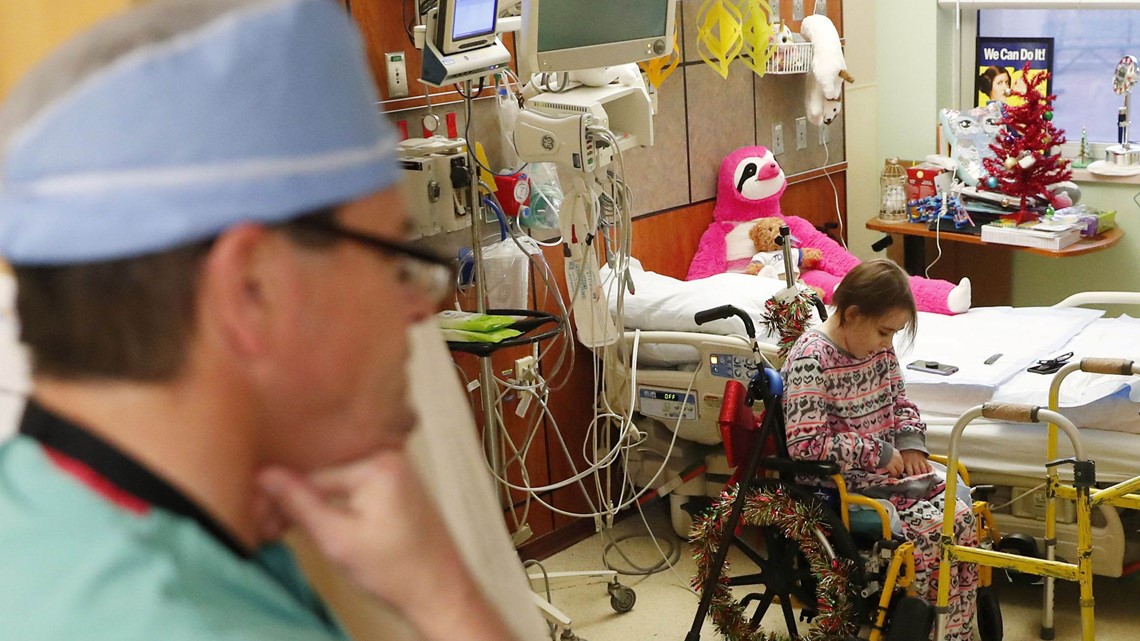
Foster wanted the infection gone. She would miss her ninth birthday four days later.
"It's all right," Isabella told him. She would do whatever he thought was best.
"I'm like a daughter to him, so he does for me what he would do for his daughter," Isabella said.
Foster marveled that Isabella seemed to grasp what needed to be done. Adults often don't take it as well.
Isabella was glad the doctor was honest with her. "I would rather know what was going to happen," she said.
If Isabella didn't understand something, she would ask for Foster. He'd come see her as soon as he finished rounds or got out of the operating room.
"I knew I could believe him," she said.
Nurses promised to bring in cupcakes to celebrate Isabella's birthday early.
For Foster, it was the lowest time in her treatment. "This wasn't just one step back," he said. "It was a huge running leap backward." He took it as hard as her family did.
Isabella's mother watched Foster as he left her room that day. Once he was out in the hallway, she saw his shoulders drop.
An award, but a bittersweet moment
Foster thought about her constantly, what he could do differently or better. When he took a vacation to Montana last summer, as his kids picked out souvenirs of the trip, Foster bought a stuffed fox for Isabella.
"As much as I love having her here and taking care of her, I do want her to get better and get out of here," he said.
"It's kind of been a constant reminder of failure."
Isabella didn't see it that way. She has adjusted to life in the hospital, getting stickers for doing well in physical therapy and surgery to earn prizes. A small speaker. An American Girl doll.
She could wheel herself to the cafeteria for pizza.
"Dr. Foster is helping me get better," Isabella said. "I couldn't do all of this without him."
Isabella was back in surgery the Tuesday before Thanksgiving, but the skin grafts didn't take.
The buttocks are one of the most difficult areas to graft because the blood supply is not good, the tissue underneath fatty and the skin typically thin. It is difficult to keep the graft immobilized long enough for the blood vessels to attach properly.
Three weeks later, Foster covered her rear end again and kept Isabella on her belly. This time, the grafts took.
Over the next few days, he removed her feeding tube and bladder catheter.
Her appetite was better. She was walking up and down the hallways with a walker and taking the stairs, one flight down and back up. Her pain was under control.
After more than 109 surgeries and procedures, if nothing else went wrong, Foster thought, she might be able to go home before Christmas

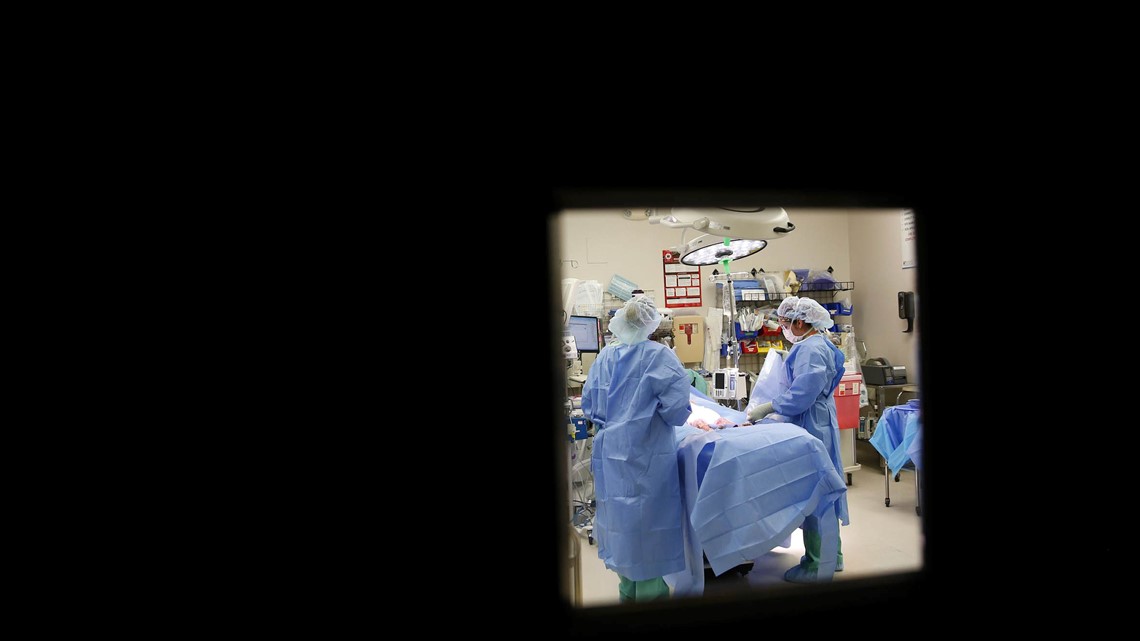
A night out, in style
On a Saturday evening, Isabella was surrounded by medical personnel, not because anything was wrong but because she was going out.
"It's not for too long but at least I'm getting out," Isabella said. "This is going to be so awesome. I'm so excited."
Her parents and brother were attending the Arizona Burn Foundation's annual holiday gala, but they didn't know Isabella was coming. Her dad had just called to say he wished she could go.
"My parents are going to freak out," Isabella said happily.
Two days earlier, Foster had asked Isabella if she wanted to go to the gala.
She knew he wasn't kidding. "Dr. Foster doesn't kid," Isabella said.
Transforming her for a night out turned out to be a community effort.
Crystalynn Ramos, who was a licensed cosmetologist before she became a nurse, dabbed concealer under Isabella's eyes.
"Your cheeks are so rosy already," Ramos said, "and look at these eyelashes." They had been singed off when Isabella was burned, but they had grown back long and thick.

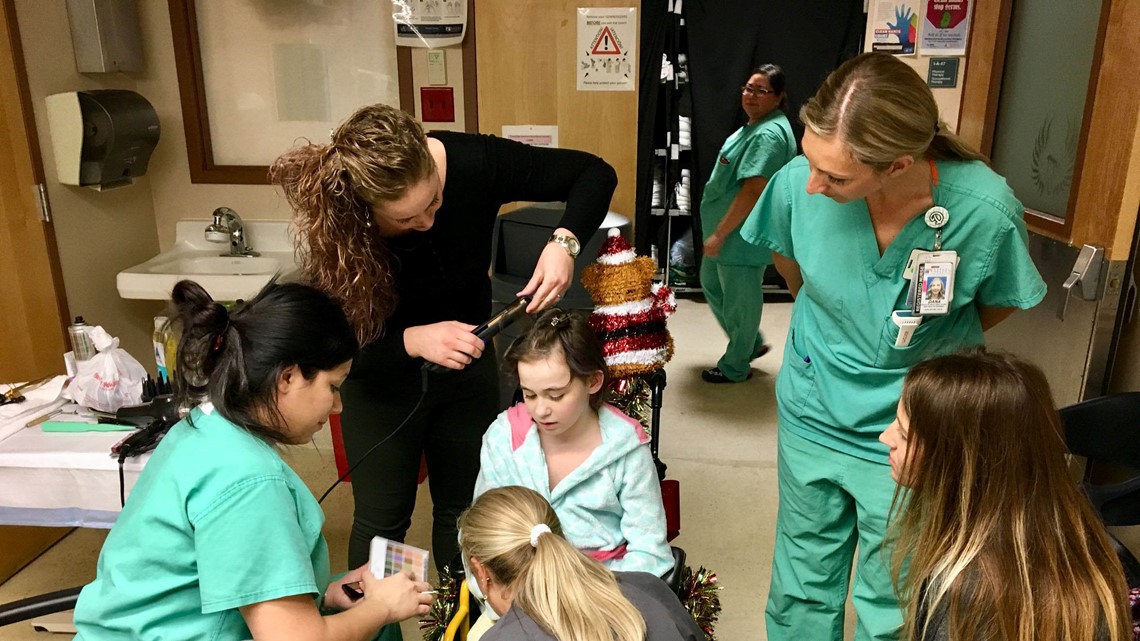
Ramos applied mascara and shimmery gold eyeliner, tipping her lashes with it.
"You are going to sparkle," Ramos said.
Her dress, hanging on the cabinet door, sparkled, too, ivory with lace, flowers and a tulle skirt.
"Isn't it beautiful?" Isabella asked. She didn't mind that it would show her scars. She was proud of them. They showed what she'd been through, how strong she was.
Nurse Brook Chavarria finished her shift and then came back in to do Isabella's hair, bringing her dress and heels for the gala.
Isabella looked sideways at the flat iron Chavarria used to curl her hair. The heat coming off it made her nervous.
"I won't burn you, I promise," Chavarria said carefully releasing a ringlet. She had been on duty when Isabella first arrived in the emergency department.
Burn technician Erin O'Neill painted Isabella's fingernails a shimmery rose gold.
Emily Helmick, a physician resident, had bought Isabella a pair of glittery purple flats and a matching purple clutch.
Isabella picked a lip color, Wet n Wild's "Rose the Matter."
Ramos clipped diamond clips into her hair like a crown.
Isabella carefully stood holding onto the back of her wheelchair while the bandage on her back was changed, the area still raw from where Foster had taken skin grafts for her last surgery.
Then, with O'Neill on one side and Helmick on the other, Isabella stepped into her dress.
O'Neill tied the bow on the back. Isabella turned from side to side, making the skirt swish, smiling.

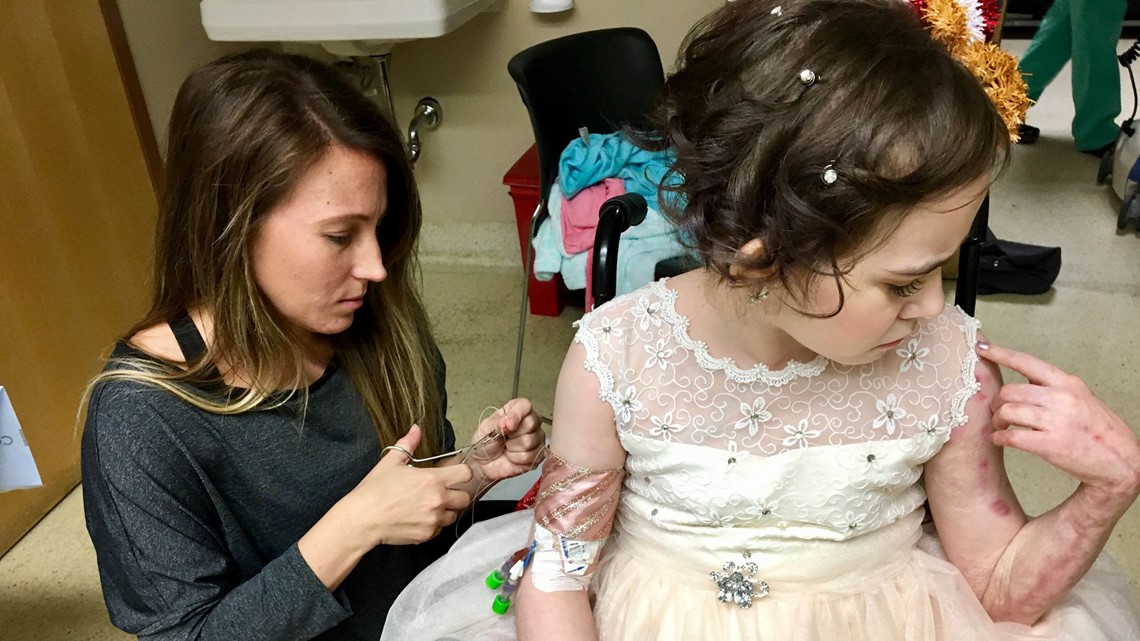
"The shoes," Isabella remembered. Helmick squatted down and gently guided her feet into the glittery flats.
They fit perfectly. Like Cinderella.
Nurse Dana Rogoveanu gave Isabella an oral dose of pain medication. It should last the evening.
Isabella eased herself back into her wheelchair and fluffed out her skirt.
Her escorts were three firefighters who have volunteered to take Isabella in an ambulance. The gurney was draped with silver tinsel.
"You look so beautiful, honey," Rich Lara said. "The shoes are the best."
"We don't get to take a princess out very often," Kevin Duzy said.
"We'll have her home by midnight," Lara promised.
It was the first time Isabella had left the hospital in 268 days.

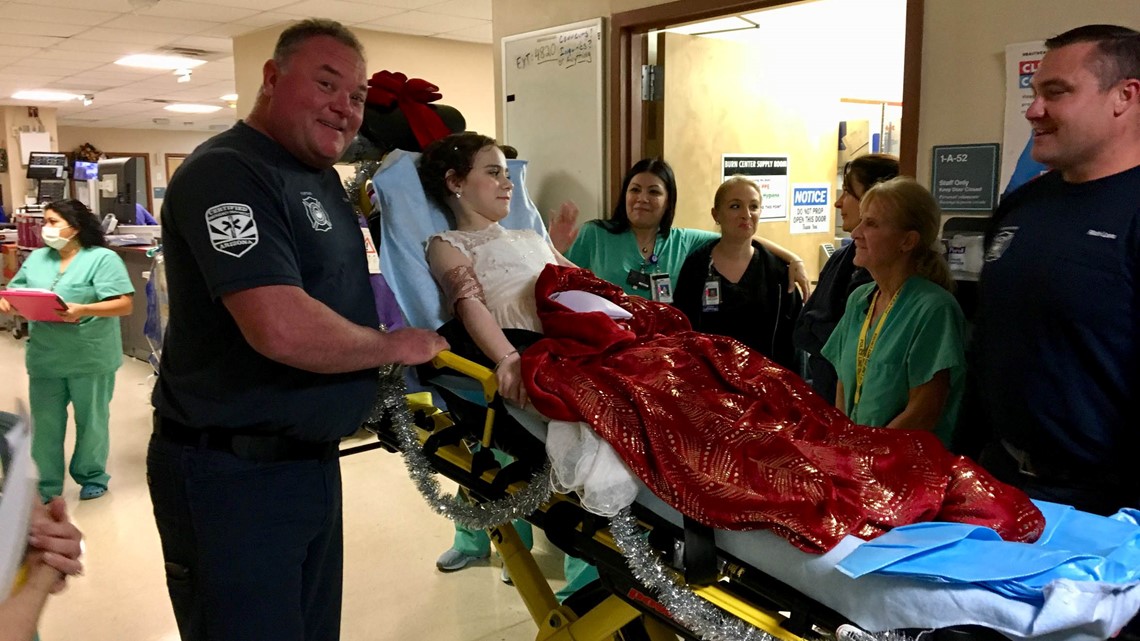
'You're going to forget about me'
Four days later, Isabella was still wearing the glittery purple flats with her pajamas.
The gala was fun, she said. Her parents were surprised to see her there. "My dad lost it," she said, grinning.
Someone at the gala donated $1,500 to pay for Isabella to go to burn camp next summer.
Mark Dewane, head of the board that over sees the burn center as part of the Maricopa Integrated Health System, told Isabella her nursing school tuition would be paid if that's what she decides to do.
The next day, Isabella texted Foster: "Hi, Dr. Foster. It's Isabella. I hope you're having a great day."
He texted back: "I hope you are getting some rest after your big night."
She took a picture of herself making a funny face and sent it to him, captioning it, "I woke up like this."
Foster texted back: "Go back to sleep."
Later that day, the doctor came in to tell Isabella that she would go home on Monday, nine months to the day she was admitted. She knew he wasn't kidding.
"Dr. Foster is kind of a serious guy because he has a serious job," Isabella said.
Now the doctor leaned into Room 9 and noticed Isabella's shoes.
"If I had a pair of shoes like that, I'd wear them every day, too," Foster said.
She told him that she had done her dressing change that morning with no intravenous pain medication, just 5 milligrams of oxycodone.
Isabella asked if she'd have to be sedated to remove the PICC line from her arm. "How will you guys take it out?" she asked.
He'll tug it out, Foster told her. Isabella raised her eyebrows. "You'll look out the window, and it will be out," he said. "It's a piece of cake compared to what you've been through."
Isabella has a list of people she is going to miss when she leaves. She told Foster she would miss him the most.
"You're going to forget about me the minute you walk out of here — and that's the way it should be," the doctor told her.
"But I'm never going to forget you."
Reach Bland at karina.bland@arizonarepublic.com or 602-444-8614. Read more at karinabland.azcentral.com.

